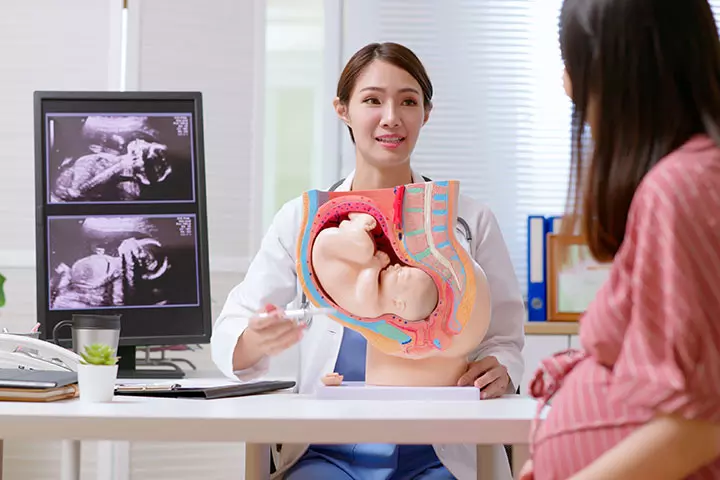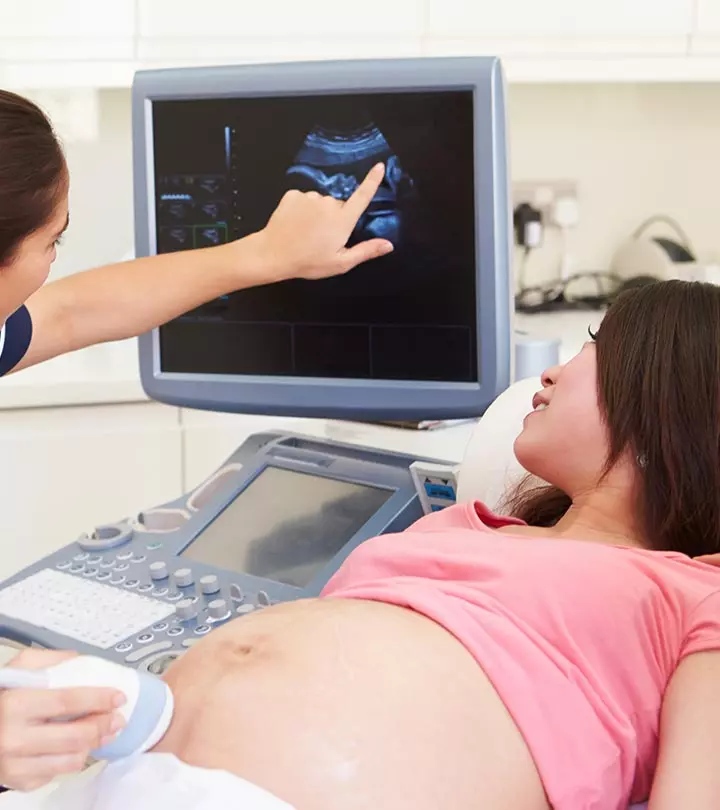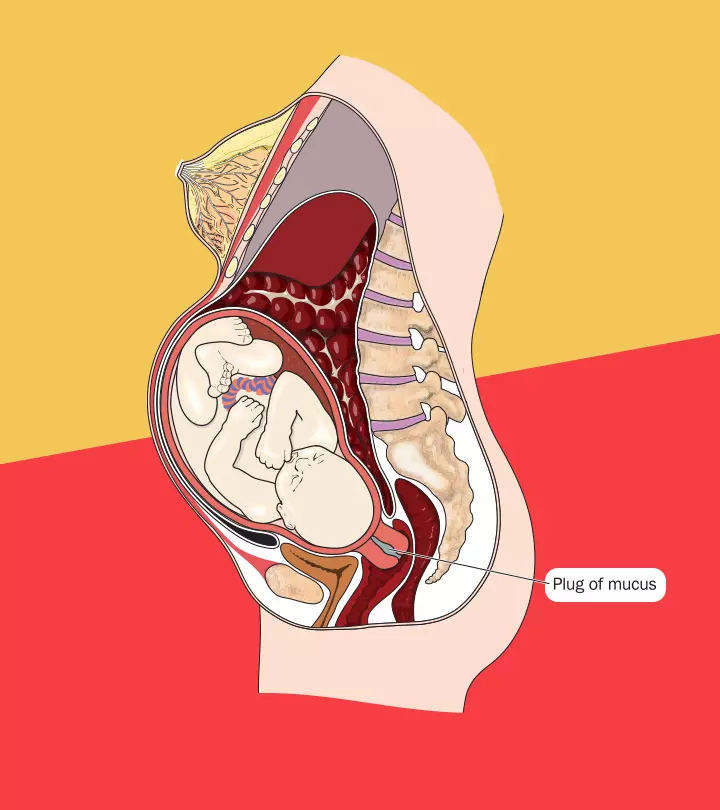
Image: Midjourney/ MomJunction Design Team
Third-trimester nausea and vomiting are less common. Usually, nausea and vomiting subside by the 16th week of pregnancy in most women. Overall, only 20% of pregnant women experience nausea and vomiting throughout pregnancy (1).
The exact causes of nausea and vomiting in pregnancy are unknown, but knowing and avoiding triggers can help you manage the condition. Occasional incidence of nausea and vomiting in the third trimester may not be a cause for concern. However, seek medical care if you have persistent nausea or vomiting in the third trimester.
Read on to know about the common causes and preventive measures for third-trimester nausea and vomiting. The information was collected after researching different scientific journals, healthcare websites, and government official websites and has been further reviewed and evaluated by a medical professional.
Key Pointers
- Nausea in the third trimester could be due to the growing baby’s increased strain on your digestive system.
- Preeclampsia, HELLP syndrome, and AFLP can also cause nausea in the third trimester.
- Eating small frequent meals, getting enough rest, and doing some light exercises can help prevent nausea.
- Nausea in the third trimester is uncommon but generally does not indicate any harm to the mother and fetus.
Causes Of Third Trimester Nausea
According to Greg J. Marchand, MD, FACS, FACOG, program director at Steward Health, Providence, Rhode Island, “Acid reflux and stomach bugs (stomach viruses and stomach flu) are common in pregnant women in the third trimester. However, nausea that lasts the whole pregnancy is rare.”
While increasing HCG levels are one of the reasons for the first trimester morning sickness, it can be difficult to understand the cause of third-trimester nausea (2). The following could be the possible causes of nausea in the third trimester.
- Changing hormones: Frequent fluctuations in the hormones might cause nausea and vomiting in the third trimester. Pregnancy-related hormonal changes can also slow down the movement of the stomach, prolonging the time it takes for food to empty out and increasing the risk of gastroesophageal reflux disease (GERD). According to a study published in the Canadian Family Physician journal, GERD is linked to heightened severity of vomiting and nausea during pregnancy (3)
- Growing baby: The growing baby exerts a lot of pressure on the digestive system. With decreasing space in the abdomen as the baby grows, you may experience pregnancy discomfort, including nausea, heartburn, and vomiting.


- H – Hemolysis (It is the breakdown of the red blood cells)
- EL – Elevated liver enzymes (It can be a sign of liver problems)
- LP – Low platelet count (It can lead to serious bleeding)
Nausea and throwing up (that gets worse) are the common symptoms of HELLP syndrome.
Dr. Marchand adds, “Apart from stomach illnesses, worsening acid reflux, or nausea that has never subsided, you should not have a new onset of nausea in the third trimester. If you have a new onset of nausea that is not explained by one of the previously listed conditions, it could be a sign of pregnancy complications, such as HELLP syndrome.”
- Acute fatty liver of pregnancy: Acute fatty liver of pregnancy (AFLP) is a rare but serious problem. The exact cause of AFLP is unknown. However, it starts late in the third trimester of pregnancy and can cause nausea and vomiting (7).
 Did you know?
Did you know?
8. Hyperemesis gravidarum: Hyperemesis gravidarum is a condition in pregnancy where one experiences intense nausea and vomiting, which can be highly unpleasant. This condition usually occurs during the first trimester of pregnancy (at around six weeks). The symptoms of hyperemesis gravidarum can last longer than regular morning sickness, typically for weeks, months, or even until delivery, posing challenges in carrying out routine activities. These symptoms may include vomiting more than three times a day, dehydration, lightheadedness, continuous dizziness, and weight loss. If the situation becomes complicated and dehydration ensues, seeking treatment at the hospital may be necessary (8).
9. Overheating: Another potential reason for nausea and dizziness during the third trimester may be caused by overheating during the summer or intensive exercise routine. According to the Centers for Disease Control and Prevention, overheating can make the pregnant woman feel dizzy and nauseated anytime during pregnancy more easily than non-pregnant women of her age (9). They may even experience warm heat, muscle cramps, and headaches. Adding to this comment from the CDC by citing the situation during hot summers, Dr. Elizabeth Suzanne Langen, an assistant professor in the University of Michigan’s Department of Obstetrics & Gynecology, says, “It’s not unexpected to see pregnant women come to the hospital … on a hot summer day. When you’re pregnant, your body is already working hard to keep you and your baby healthy, so adding the hard work of keeping cool can push you over the edge” (10).
Ways To Prevent Third-Trimester Nausea
The following measures can help in preventing nausea (11) (12).
- Try to get enough sleep and rest, as it can help subside stress hormones and tiredness that may cause nausea.
- Avoid caffeinated beverages, including tea, and coffee as they aggravate your symptoms.
- Eat small, frequent meals throughout the day to be digested easily and prevent an empty stomach (13).
- Consume a lot of fluids to avoid dehydration and associated nausea.
- Practice gentle exercises after consulting your healthcare provider to be in better shape and promote relaxation.

- Avoid lying down immediately after meals and have your dinner two to three hours before bedtime. Explaining the reason behind it, certified nurse-midwife Jessica Costa, MSN, APRN, CNM, at the Wooster Specialty Center, USA, says, “This (lying down immediately after eating) hinders digestion and contributes to that queasy feeling” (14).
- Sugary, spicy, and greasy foods can worsen the nausea symptoms. Identify which food triggers your symptoms to avoid them.
- Some fragrances or smells can trigger your nausea due to ever-changing hormones, so avoid them.
- Eating bland food or high-protein foods might help as they are easy to prepare and do not have a strong smell. You can include rusk, Jell-O, popsicles, chicken broth, saltine crackers, gelatin desserts, pretzels, etc.
- Ginger shows varying effectiveness in different women with nausea and vomiting of pregnancy (1).

If nausea and vomiting are too severe, contact your healthcare provider. They might prescribe the necessary medications to help you feel better.
 Quick tip
Quick tipSigns You Need To See A Doctor
While nausea and vomiting of pregnancy are not always a sign of a problem, you should see your doctor in the following scenarios.
- Inability to keep any food or fluids down
- Loss of appetite
- Sudden weight loss
- Reduction in the fetal movement
- Severe weakness
- Dizziness
- Several episodes of vomiting throughout the day
Seek immediate medical attention if you experience abdominal pain or signs of severe dehydration.
Frequently Asked Questions
1. Can I take medication for nausea in the third trimester?
According to the US Food and Drug Association (FDA), a combination of doxylamine succinate and pyridoxine hydrochloride tablet (trade name Diclegis) can manage nausea and vomiting in pregnancy (15)
Some antihistamines, ondansetron, phenothiazines, metoclopramide, and corticosteroids can also treat nausea and vomiting in pregnancy (1). However, do not use any medicine without your doctor’s consent.
2. Can third-trimester nausea be a sign of labor?
While nausea is not a conclusive sign of labor, sudden and persistent nausea in the third trimester can indicate premature labor (16).
3. Is nausea in the third trimester normal?
Third-trimester nausea is not common. However, it does not always happen due to an underlying pathology. Nausea in the third trimester does not indicate any harm to the mother or fetus, but communication with professionals is necessary since they will be able to handle the condition better.
4. Does nausea while pregnant affect the baby in the third trimester?
Nausea or vomiting do not directly affect the baby but can cause discomfort for the expectant mother. Mild vomiting may not have any impact on the mother and the baby. However, excessive vomiting can lead to dehydration and appetite loss. Both dehydration and appetite loss during pregnancy can affect maternal and fetal health.
5. How long can I go without eating while pregnant to avoid nausea?
Nausea may occur or worsen if you go too long without eating during pregnancy. It is recommended to eat every two hours if you experience nausea during pregnancy. Avoid consuming high-fat or greasy foods that are difficult to digest (17).
6. What drinks help with pregnancy nausea?
Some women may find relief in drinking carbonated beverages such as sodas, milk, or tea. Drinking peppermint or spearmint tea can also help reduce nausea and vomiting in some women. Chamomile and ginger tea can also help relieve nausea (17).
Nausea is a common occurrence during the initial weeks of pregnancy. However, third-trimester nausea is not a common symptom and should be reported to the doctor at once. If left unattended, nausea during the third trimester might lead to dehydration and also increase the chances of complications for the baby and the mother. Treatment of such severe cases of nausea might require hospitalization and the administration of intravenous fluids. Thus, it is advised that pregnant women should stay hydrated, avoid spicy or oily food and get enough rest and sleep to avoid the symptoms of nausea.
Infographic: How Can You Avoid Nausea During the Third Trimester
Just when you were happy that your morning sickness had subsided in your second trimester, it might have bounced back as soon as your third trimester began. The good news is that you can prevent nausea in your third trimester. The infographic below offers tips on controlling or suppressing nausea toward the end of your pregnancy.

Illustration: Momjunction Design Team
Illustration: Reasons For Third Trimester Nausea And Its Prevention

Image: Dall·E/MomJunction Design Team
If you’re pregnant and feeling nausea, learn how to manage vomiting during the third trimester. Learn how to reduce and cope with this bothersome symptom.
References
- Adrienne Einarso et al.; (2007); Treatment of nausea and vomiting in pregnancy.
https://www.ncbi.nlm.nih.gov/pmc/articles/PMC2231543/ - Morning Sickness.
https://www.stanfordchildrens.org/en/topic/default?id=morning-sickness-1-2080 - SIGNS & SYMPTOMS.
https://www.preeclampsia.org/signs-and-symptoms - Ruth Law et al.; (2010); Treatment of heartburn and acid reflux associated with nausea and vomiting during pregnancy.
https://www.ncbi.nlm.nih.gov/pmc/articles/PMC2821234/ - Sarosh Rana et al.; (2019); Preeclampsia: Pathophysiology, Challenges, and Perspectives.
https://www.ahajournals.org/doi/full/10.1161/CIRCRESAHA.118.313276#d1e2216 - HELLP SYNDROME.
https://www.marchofdimes.org/find-support - Acute Fatty Liver of Pregnancy.
https://www.stanfordchildrens.org/en/topic/default?id=acute-fatty-liver-of-pregnancy-90-P02465 - Hyperemesis Gravidarum.
https://my.clevelandclinic.org/health/diseases/12232-hyperemesis-gravidarum - Heat and Pregnancy.
https://www.cdc.gov/heat-health/risk-factors/heat-and-pregnancy.html - Summer heat brings special health risks for pregnant women.
https://www.heart.org/en/news/2019/07/01/summer-heat-brings-special-health-risks-for-pregnant-women - Morning Sickness.
https://familydoctor.org/condition/morning-sickness/ - The Pregnancy Book.
https://www.stgeorges.nhs.uk/wp-content/uploads/2013/11/Pregnancy_Book_comp.pdf - Morning Sickness: Nausea and Vomiting of Pregnancy.
https://www.acog.org/womens-health/faqs/morning-sickness-nausea-and-vomiting-of-pregnancy - Morning Sickness? 12 Remedies That Really Work.
https://health.clevelandclinic.org/morning-sickness-10-tips-to-tame-your-turbulent-tummy-day-or-night - DICLEGIS- doxylamine succinate and pyridoxine hydrochloride tablet, delayed release.
https://www.accessdata.fda.gov/drugsatfda_docs/label/2013/021876s002lbl.pdf - Premature Labor.
https://my.clevelandclinic.org/health/diseases/4498-premature-labor - Coping With Common Discomforts Of Pregnancy.
https://www.ucsfhealth.org/education/coping-with-common-discomforts-of-pregnancy#:~:text=Going%20too%20long%20without%20eating,are%20more%20difficult%20to%20digest
Community Experiences
Join the conversation and become a part of our nurturing community! Share your stories, experiences, and insights to connect with fellow parents.
Read full bio of Dr. Irene (Eirini) Orfanoudaki
- Dr. Marchand, originally from Providence, RI, is dual board-certified in Ob/Gyn and minimally invasive gynecologic surgery. He is extensively published in the field of minimally invasive surgery and is accredited by the Society of Laparoscopic & Robotic Surgeons (SLS). He is a fellow of both the American College of Obstetrics and Gynecology (ACOG) and American College of Surgeons (ACS).
 Dr. Marchand, originally from Providence, RI, is dual board-certified in Ob/Gyn and minimally invasive gynecologic surgery. He is extensively published in the field of minimally invasive surgery and is accredited by the Society of Laparoscopic & Robotic Surgeons (SLS). He is a fellow of both the American College of Obstetrics and Gynecology (ACOG) and American College of Surgeons (ACS).
Dr. Marchand, originally from Providence, RI, is dual board-certified in Ob/Gyn and minimally invasive gynecologic surgery. He is extensively published in the field of minimally invasive surgery and is accredited by the Society of Laparoscopic & Robotic Surgeons (SLS). He is a fellow of both the American College of Obstetrics and Gynecology (ACOG) and American College of Surgeons (ACS).
Read full bio of Dr. Ritika Shah
Read full bio of Rebecca Malachi
Read full bio of Dr. Joyani Das




















